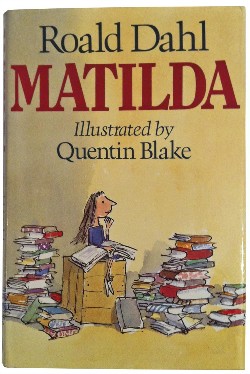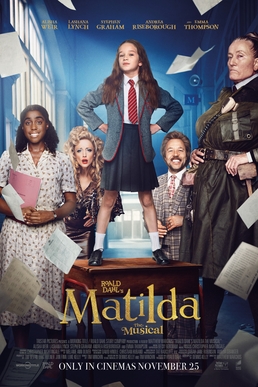Matilda is one of my favorite books of all time. She's the first character I remember looking at and thinking "oh she's me for real". As the tiny, dark-haired, overlooked, book-loving daughter of a smallish, angry, mustachioed man prone to shouting, I added her to my heart immediately. She's the first mirror I remember. While I technically haven't read Matilda that many times, I remembered quite a lot of the book and its little details. I had forgotten Matilda was kind of rude to Miss Honey about being poor and living in a cottage just barely better than a shack (unsurprising, given her awful parents), leaving me to mentally go "that's not in the book!" when the movie showed it. I'd forgotten about the boys Miss Trunchball tortured, although I re-remembered the ear-stretching scene when it happened in the movie. I remembered Bruce Bogtrotter and the enormous chocolate cake, Mrs. Phelps and the library, and Lavender and the newt. I'd remembered most of Matilda's revenge pranks on her family, and of course the wonderful comeuppance at the end. It struck me how quiet and slow-moving the book is, compared to my memory of it. Each chapter focuses on a specific part, and we move along like a bulleted list.
It's interesting how many British authors have written about characters stuck in horrible, abusive schools. This mirrors their own experiences; British boarding schools have historically been neglectful, abusive places filled with bullies and tyrannical teachers who used physical force. Major trigger warnings for all the abuse, but this article talks about it. Roald Dahl himself wrote a memoir, Boy, about his childhood and experiences in said schools. C.S. Lewis went to one such awful boarding school, and the schools in his children's books are similarly awful. It strikes me that having so many generations go through abusive & neglectful schools kind of explains why England was so awful to the countries it invaded; abused people often abuse people.
The parents were pretty much perfect (i.e. gross and mean). The actress playing Mrs. Wormwood is very thin; the book Mrs. Wormwood is fat, and the view and descriptions of her character are pretty fatphobic, so I'm not mad at the change. Both movie parents have more middle?-class accents, which makes sense for a used car dealer and his wife, but can come off as classist as all the other characters have nicer British accents (I love all British accents). In the movie, Mrs. Wormwood didn't want to be pregnant or have a baby at all, being in denial about it, and Mr. Wormwood wanted a boy and not a girl. He refers to Matilda as "boy" and he/him during the movie, with Matilda saying "I'm a girl" after each time; this, as some tumblr user pointed out, makes her trans-coded. They cut out Matilda's older brother, which I guess kind of makes sense for movie streamlining, but that also lowers the heartbreak and unfairness as the parents treat the son normally/nicely and treat their daughter terribly. This is consistent with what narcissistic parents often do; they have a favorite child and a scapegoat child. The only parental prank they cut out was the parrot one, which makes sense. It's probably the least satisfying one, anyway. It would have been funnier if Mrs. Wormwood cut the glued-on hat off Mr. Wormwood's head like in the book, but I guess they wanted to cut down on the hair and makeup budget. I'm guessing the other song that was cut was the parents', maybe the "you chose books/I chose looks" line, which would make a fantastic song. In the end of the movie, when Matilda magics the hat off her father's head as a thanks for finally calling her his daughter and letting her stay with Miss Honey, was nice but not in the book. The Wormwoods deserve no redemption.
I like the diverse casting for the movie. I'm guessing they changed Mrs. Phelps' library into a cute retro bookmobile library so they could shoot in different pretty locales, but I'm not mad at it. I want to dress like her when I grow up. I'm not sure why the movie adaptations all tend to make Lavender (Matilda's best friend) meek and sometimes even mousey; maybe it's to set off how courageous Matilda is? In the book, they are described as equally gutsy and adventurous. The movie understandably made the other memorable kids (Bruce, the pigtails girl) be in Matilda's class. I get the reason for this, but it does mean we don't deal much with the other students. I didn't like how Bruce gets dragged to the chokey after finishing the cake in the movie; this doesn't happen in the book, as Trunchball accepts her defeat angrily. Miss Honey was perfect. You felt for her and rooted for her to be free. Emma Thompson played Miss Trunchbull very well, with her weird square fake jaws and fatsuit and weird, blocky platform shoes. She was adequately scary. I'm not sure why they moved the chokey from her headquarters to the woods, but it was creepy. It could definitely be argued that movie!Matilda's final revenge was definitely way past her abilities (making a chain monster AND destroying all the chokeys [excellent choice btw] AND plaiting Trunchball's hair into two braids at the same time AND spinning and throwing her out the window by her hair). That would've knocked Matilda out a third of the way through. The changes did feel more cathartic, though; Trunchball deserved to be thrown out the window by her hair. Having the children read out the "ghost's" words on the chalkboard out loud in unison? Perfectly creepy.
On the biggest addition to the movie: despite their backstories already being incredibly similar, the movie decided to really underscore this by giving Matilda psychic abilities on top of her telekinesis: she sees pieces of Miss Honey's story, in which Miss Honey's parents are circus performers for some reason and Miss Trunchbull is responsible for Miss Honey's mother's death as well as her father's, and abused Miss Honey as a child. It is really interesting, though, how we the audience are made to think it's Matilda dealing with her parents' abuse and neglect through this story she's telling Mrs. Phelps; indeed, Matilda sees herself as the abused little girl. They sadly left out Miss Honey's courageousness in becoming a teacher and renting the cottage behind her aunt's back; I love that for her. I love her cottage, too; it makes sense she'd decorate it with her pupils' art, and it should have been like that in the book. TBH, the book takes it a bit too far: Miss Honey sleeps on the floor and owns no furniture. You're telling me she wouldn't find stuff off the street or at yard sales? Anyway. The movie ends very similarly to the book, with Miss Honey getting her house back and the Wormwoods running away from the consequences of Mr. Wormwood's crookedness and letting Matilda live with Miss Honey. In the movie, Miss Honey is also left in charge of the school and turns it into a beautiful, colorful, carnival-inspired Montessori dream. The book is more practical: an older, good teacher became headmaster after Trunchbull bounced.
I really liked the songs in the movie; they intersected and played together beautifully. I really like the cleverness of the alphabet/school song and had "Revolting Children" stuck in my head for days. It's been ages since I've watched the 1990s Matilda, but I feel that this one is the closest adaptation yet. Matilda the Musical is on Netflix, and I really recommend it.
Trigger warnings for both book and movie: child abuse, physical abuse, verbal abuse, neglect, child endangerment, children forced to stand in nail-studded spiky closet for hours without being able to sit, child forced to eat a huge cake (food-related abuse), abusive parents, narcissistic parenting, abusive and enabling school staff, adult basically enslaves child and forces her to do all the cleaning, adult waterboards child (book only), off-page/screen suggested murder, poor adult, food insecurity, newts




No comments:
Post a Comment